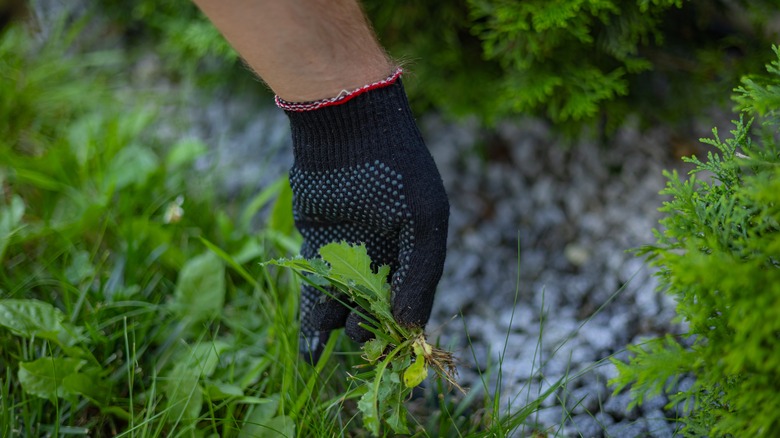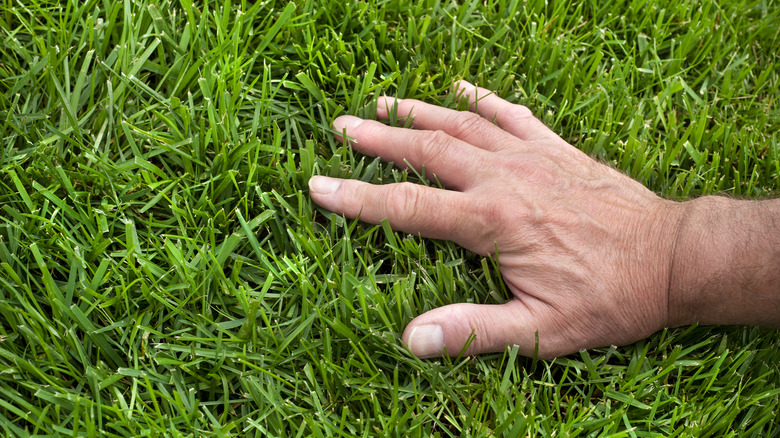Say Goodbye To Weeds Without Killing Your Grass With One Simple, Natural Solution
When you put in the work to try and maintain a healthy lawn, it can be disheartening to see weeds pop up among your grass. The fact is that weed control is a year-round process that requires regular mowing sessions, and pulling the occasional weeds by hand can also go a long way in overall weed control. You might even consider the use of both pre-emergent and post-emergent weed killers when appropriate. Despite the benefits of commercial weed killers, not everyone is thrilled about applying potentially harmful chemicals to their lawns. If you fall into this camp, you might consider the pros and cons of using a more natural weed-killing solution such as corn gluten meal.
Just as its name suggests, corn gluten meal is made from the byproduct of corn processing. The meal is often used as feed for animals in agricultural settings, such as poultry and cattle. It's even used in some dog food products. Corn gluten meal is also considered a high-protein source of up to 60%, as the product itself is stripped of fiber and starches during processing. Given the importance of corn gluten meal as a food source for many animals, it might seem far-fetched to use the product in your yard. It turns out corn gluten meal does indeed have its place in lawncare, and it's considered a non-toxic method you might consider using alongside repurposed common household items to help control weeds. Still, it's also important to know which products to use, their benefits, and possible limitations.
How corn gluten meal may work against weeds
Corn gluten meal is safe to use around people and pets, but you're also likely wondering how this corn byproduct might work without chemicals. The use of corn gluten meal for lawncare stems from research conducted during the mid-1980s by Iowa State University professor Nick Christians, who discovered that the proteins in the product had herbicidal effects. In fact, corn gluten meal is considered among the very first "natural" weed killers. It's best used as a pre-emergent herbicide, which helps to target seeds before they germinate and turn into weeds. In particular, corn gluten meal may help to control dandelion, foxtails, pigweed, crabgrass, and other common weeds that typically crop up in home lawns.
When applied to lawns, corn gluten meal has the added benefit of naturally occurring nitrogen, which can act as a grass fertilizer. Aside from using pre-emergent herbicides, fertilizers are other tools that can help control weeds by making grasses strong enough to crowd them out before they can take root. They work well when you also follow the things you should never do when fertilizing your lawn, including fertilizing too late in the summer and forgetting to water after fertilizing. Also, like other types of pre-emergent herbicides, corn gluten meal should be applied in early to mid-spring to target weed seeds before they get an opportunity to germinate. Your grass might benefit from an additional application in the late summer or early fall. It's important to follow all package instructions for proper application. Generally, you should not water your grass immediately after putting down corn meal gluten, or else the product might wash away before it gets a chance to take effect.
Downsides and limitations of corn gluten meal to consider
Despite all of the potential benefits of this natural herbicide, there are also some downsides to consider. For one, corn gluten meal is generally pricier than chemical-based pre-emergent products, and it might not hold up well during periods of excessive rain. You also need to use quite a bit of product, between 20 and 40 pounds for every 1,000 square feet of grass, which can quickly add up in cost.
While the product could benefit your grass while preventing certain weeds from taking root, you should also know that such results may not be achieved during the first season. In fact, you might see exponential improvements year after year of continued corn gluten meal usage. Also, keep in mind that corn gluten meal does not act as a post-emergent herbicide. It cannot treat existing weeds, so you should not expect such results when applying the product in your yard. This is similar to the way chemical-based pre-emergent weed prevention helps to manage weeds. Another issue is the lack of selective nature of corn gluten meal, so it might harm other plants in the area, too.
Since its discovery for weed control several decades ago, corn gluten meal is now sold by various brands. While this arguably makes the natural herbicide more accessible, it's important to read product labels carefully so you can pick the best version for your lawn. Look for products with 60% protein content for best results. Also, while you may find the product in both powder and in granulated form, you might consider the latter version due to its ease of application.

